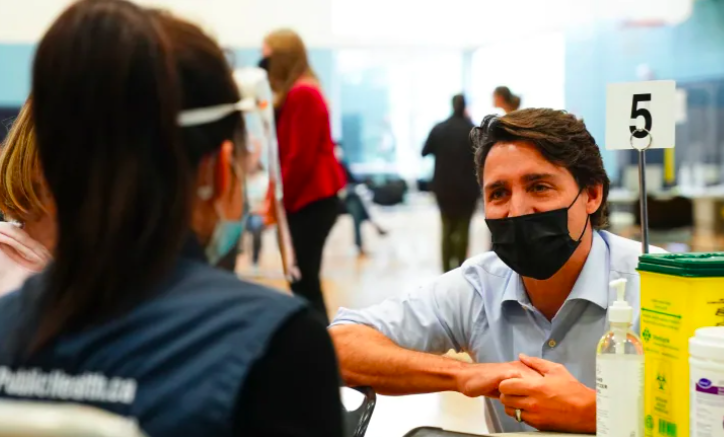
I wrote this to emphasize Sweden’s reliance on voluntarism and common sense. For some readers, the whole piece was about masks. Sorry about that. It generated 535 comments on the National Post site.
New COVID variants, cooler weather and crowded classrooms have made many people wonder when, not if, restrictive public health measures will return.
Before 2020, we dismissed seasonal flu bugs and reacted in surprise at overcrowded hospitals each January. Today, Canada seems primed to embrace restrictive measures to “protect the system.” Many other countries would agree.
Why don’t we learn from Sweden?
Matt Hancock, Britain’s former health secretary, privately called it the “f—–g Sweden argument.” Hancock saw no need for discussion. At the height of the pandemic, he instructed an aide to “supply three or four bullet (points) of why Sweden is wrong.”
Of course, Hancock never intended these writings become part of The Lockdown Files, an investigation by The Telegraph into 100,000 leaked WhatsApp messages exchanged within the British government during the pandemic. Regardless, his comments captured what every other government did: dismiss or diminish Swedish pandemic performance.
Sweden’s voluntary approach resulted in far fewer deaths during the pandemic, no matter how you measure it.
Canada performed better than most of Europe, but not as well as Sweden. In early 2023, Statistics Canada reported that there were 7.6 per cent more deaths than expected between March 2020 and August 2022. Of the country’s 53,741 excess deaths, 42,215 have been attributed directly to COVID-19. Canada beat Europe’s average excess mortality rate of 11.1 per cent from 2020 to 2022, but not Sweden’s 4.4 per cent.
In a new analysis for the Cato Institute, Johan Norberg describes how Sweden followed a voluntary approach to pandemic policy interventions. Its emphasis on personal responsibility achieved the smallest economic impact, and the least educational loss for students.
Voluntary action does not mean zero restrictions. Sweden limited public gatherings (for example, in theatres and churches) to less than 50 people, but it did not restrict “workplaces, shopping centres or private gatherings.” It banned private visits to nursing homes. Bars and restaurants could offer only table service, and alcohol sales had an earlier cut-off time during 2020 and 2021. Universities and secondary schools were recommended to go online.
However, preschools and elementary schools stayed open. Borders stayed open; no curfews or stay-at-home orders were made; no state of emergency was declared. Public transportation kept running, and there were no mask mandates, especially in schools.
Past experience does not guarantee future performance. In a society that craves certainty, medicine cannot eliminate all cause for anxiety. Therein lies the crux.
The new BA.2.86 COVID variant has some specialists in Ontario and British Columbia concerned. We could even face COVID, RSV and influenza all at the same time: a “tridemic.” Some are calling again for masking. However, Ontario Education Minister Stephen Lecce announced last week that his province’s schools would not make masks mandatory.
Many experts in acute care hospitals seem determined to bring back masks for any virus, despite the evidence. In 2019, the World Health Organization (WHO) published an extensive review of “non-pharmaceutical public health measures” for mitigating influenza. The WHO could not find any evidence that wearing a mask reduced influenza transmission. A Cochrane review published in January also found little evidence to support masking. A study of a London hospital in the United Kingdom during Omicron demonstrated no difference in hospital transmission rates with or without mask mandates.
Dr. Martha Fulford, an infectious disease specialist in Hamilton, Ont., says that new mask mandates are a matter of optics.
“The sad part is that I think masking is now being done because (hospitals) are expecting increasing patient volumes as (respiratory virus) season starts up,” Dr. Fulford told me in a direct message late August. “They have built zero extra capacity, and the masks make it seem like they are doing something. It’s not about data; it’s all about optics…. Now we are just masking for any old virus, it would seem.”
Mandatory masking relies on force to implement. Sweden avoided force, relied on voluntary measures and outperformed its neighbours as a result.
The Lancet published research in June which suggests people transmit viruses primarily when they have viral symptoms. Simply finding virus particles on a nasal swab probably does not matter anywhere near as much as feeling sick. Applying those findings, we can probably go to work safely when we feel well, and we should probably stay home when we feel sick. Healthy people are healthy — who knew?
In a crisis, governments crave conformity, not individual success. Sticking together matters more than standing out. As such, Sweden drove neighbouring governments nuts. The Swedes outperformed everyone else. Maybe we can learn from them.


